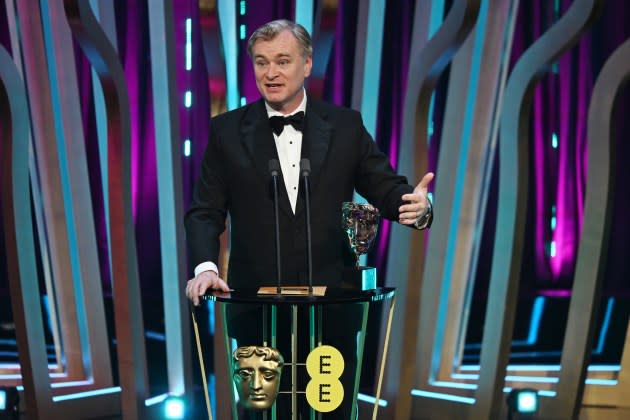BAFTAs: Christopher Nolan Scores First Best Director Win From British Academy With ‘Oppenheimer’

Given the number of high-wattage films garnering multiple nominations at the BAFTAs this year, the rationing of awards was always likely unpredictable on the night. And so it proved, meaning that The Zone of Interest and Poor Things had already nibbled away at Oppenheimer’s chances of a decent sweep before the Best Director award came round. With Poor Things director Yorgo Lanthimos inexplicably left out of the race, a category snub this year for Christopher Nolan would absolutely have sent a signal to the British-American director.
Luckily, the fates were smiling, and Nolan finally got his hands on that BAFTA. By any metric, a win is a long time overdue for this artist, whose films attracted a cult audience out of the gate and who then swiftly monetized that formula — smart, character-based genre pieces — for the mainstream. But for a crew craft awards and an acting award for the late Heath Ledger, BAFTA largely ignored his Batman trilogy and even The Prestige (2006), the cerebral sci-fi he made in between.
More from Deadline
BAFTA Parties + Events Photos: From The BAFTA Dinner To Charles Finch & Chanel
BAFTA Film Awards: Host David Tennant Takes Jab At Donald Trump In Opening Monologue
Since Inception (2010) and Dunkirk (2017), and with the notable exception of Interstellar (2014), Nolan has twice garnered the three crucial nominations in his field — Best Film, Best Director and Best Screenplay — to no avail. The recent award of a BFI Followship almost seemed like a brave effort to correct that oversight, and sent a slightly worrying signal that, even with 13 nominations for Oppenheimer, he might yet go home empty-handed.
Nolan turned a blind eye to all this baggage and accepted his award graciously — unlike his long-term colleague Michael Caine, who famously brought up his years “out in the cold” at the 2000 ceremony — and reminisced about being taken to the Royal Festival Hall by his parents as a child “to make me have some culture”.
As well as his cast and crew, Nolan thanked Universal’s Donna Langley for “letting us or take on something quite dark and seeing the potential in that”.
“And on that note,” he continued, “I do just want to say that our film ends on a dramatically necessary note of despair. But in the real world, there are all kinds of individuals and organizations who have fought long and hard to reduce the number of nuclear weapons in the world. And since 1967, they’ve done it by almost 90%. Of late, that’s since gone the wrong way. And so in accepting this award, I do just want to acknowledge their efforts and point out that they show the necessity and the potential of efforts for peace.”
You can watch his speech above.
Best of Deadline
Berlin Film Festival 2024: ‘Yeohaengjaui pilyo’ & ‘Langue Étrangère’ Premieres On Day 5
2024 Awards Season Calendar - Dates For Oscars, Guilds, Tonys & More
2024 Premiere Dates For New & Returning Series On Broadcast, Cable & Streaming
Sign up for Deadline's Newsletter. For the latest news, follow us on Facebook, Twitter, and Instagram.

